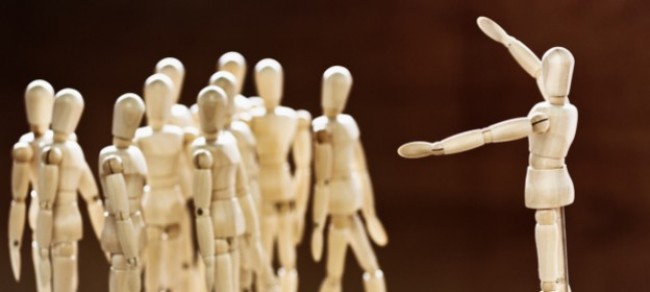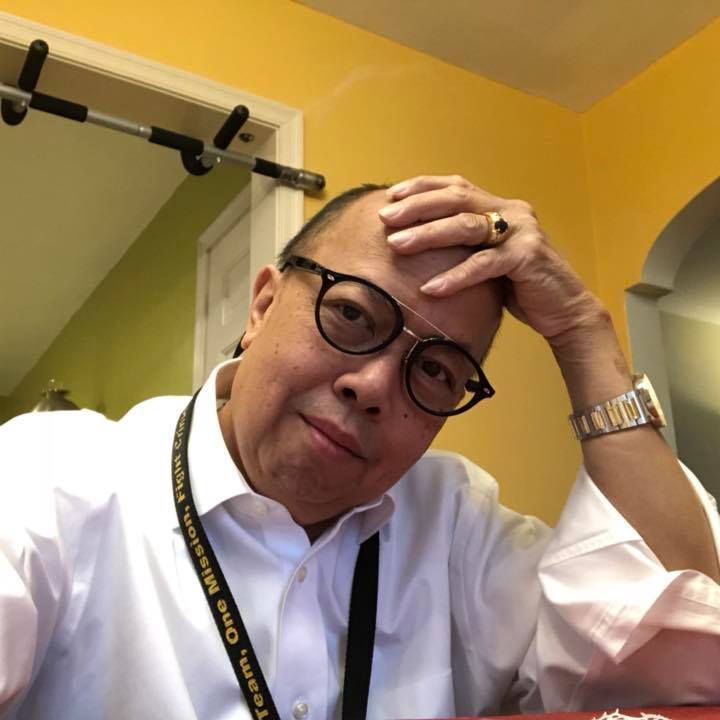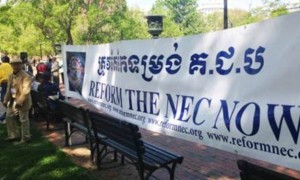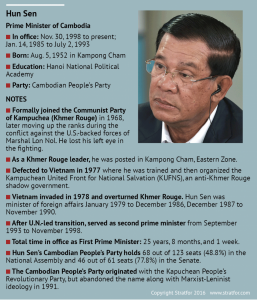Cambodia dictator
now browsing by tag
Fighting Against Dictatorship
Op-Ed & Original Reference: INSEAD
Manfred F. R. Kets de Vries, INSEAD Distinguished Clinical Professor of Leadership Development & Organisational Change | January 18, 2018

Dictatorial types gain and maintain power through a number of social processes and psychological dynamics.
From our Palaeolithic roots onwards, dictators – whether they led tribes, fiefdoms, countries, religions or organisations – have always been with us. We have always been attracted to individuals who appear strong. Some people are easily persuaded to give up their freedoms for an imaginary sense of stability and protection, not to mention an illusion of restored greatness.
Generally speaking, times of social unrest have always been the feeding ground for dictators. Periods of economic depression, political or social chaos give dictators the opportunity to appear as saviour and, when conditions allow it, seize power by coup d’état or other means. Their populist demagoguery can seduce broad swathes of the population. However, most of their inflated promises turn out to be no more than hot air. So how is it that they’re able to gain and maintain power? They succeed by taking full advantage of known social processes and dynamics.
Riding the confirmation bias: First, they are extremely talented at inflaming the “wish to believe”. Their cries of patriotism and righteousness are just what the populace wants to hear. The unquestioning acceptance of a dictator’s rhetoric is rooted in humankind’s most pervasive bias – the confirmation bias. This compels us to look for evidence to support our ideas and desires, while discounting contradictory information. Such a bias simplifies the complexity of our world, but can also be seen as a form of “neurological laziness”. As expert manipulators, dictators take advantage of this universal cognitive shortcut.
Identification with the aggressor: Dictators are also especially good at targeting socially and economically vulnerable people – those who are not always very well educated or informed and, as such, often feel confused and insecure. Dictators exploit the rage and frustration of this population through the psychological process of “identification with the aggressor”. Many of the disempowered see in the “strong” man or woman both a reflection of themselves and the promise of a victory over their downtrodden state. They are caught in the allure of illusions and magical thinking. They become brainwashed.
The blame game: Whatever the societal wrong, dictators are adept at inciting blame and scapegoating. They play off the primitive defence mechanism of “splitting”, positioning issues in terms of in- and out-groups, magnifying external threats and fanning a collective paranoia. At the same time, dictators offer themselves as steadfast saviours. Buying into the simplistic, binary propositions, their followers align themselves with the “good fight” against evil and become intolerant of those they perceive as different.
Propaganda lords: Dictators quickly learn the value of indoctrination. To maintain their hold on power, they seek to control information, ideally by centralising all mainstream media. Positive news is attributed to them and negative news is ascribed to enemies of the state. With the help of the propaganda machine, dictators become an integral part of everyone’s life. During elections, they manipulate the final outcome by curtailing press freedom, limiting the opposition’s ability to campaign and spreading misinformation – “fake news”. Dictators also try to prevent or destroy social frameworks and institutions serving as countervailing forces.
Who’s responsible for dictators?
There will always be people whose personality makeup predisposes them to dictatorship. Many past and contemporary dictators suffer from extraordinarily high levels of narcissism, psychopathy and paranoia. They have an inflated sense of self-importance and feel entitled to the admiration of others. An inherent lack of empathy, guilt or remorse allows the most malignant to commit unspeakable atrocities.
But while it is easy to vilify dictators, we should also realise that, in many ways, we (the people) are the ones enabling them. After all, a dictator cannot function without followers. Although we may not admit it out loud, it’s attractive to have others tell us what’s right and what’s wrong. But abdicating personal responsibility cripples freedom of expression and derails democratic processes. The good news is, however, that although we enable dictators, we can also disable them.
Creating a responsible electorate
In many established democracies, the descent towards dictatorship is becoming a real threat. In this light, we need to consider two urgent questions: Can dictators in the making be “cured”? And can we prevent dictators from assuming power?
I’m afraid that the response to the first question is: “not likely”. Historical experience has proven otherwise. From a clinical perspective, most psychotherapists believe that dictators (with their psychopathic traits) tend to be untreatable. Thus, many opposing powers are needed to address the second question on how to prevent their ascension.
Prevention is better than cure, so we need to recognise potential dictators before they stealthily compromise and destroy our lives. Once they are in power, it is often too late.
A healthy democracy finds footing in a populace able to listen to different points of view and manage ambiguities. It also implies a voting population that’s knowledgeable, mobilised and engaged – not the kind to believe that voting is somebody else’s business. To prevent dictators from coming to the fore requires a population that cares for liberty and takes responsibility for it. Furthermore, the government, the head of State, the legislature, the courts, the press and the electorate should all be independent to provide countervailing oversight.
Striving for a better world
In the 1940 film The Great Dictator, Charlie Chaplin satirises Nazism and Adolf Hitler while playing the role of a Jewish barber who, in a case of mistaken identity, is forced to impersonate the absolute ruler of fictional Tomainia. At the end of the film, Chaplin delivers an impassionate speech asking the populace to unite and fight against dictatorship:
“You, the people, have the power to make this life free and beautiful, to make this life a wonderful adventure… In the name of democracy let us use that power; let us all unite…
Dictators free themselves but they enslave the people… Let us fight to free the world, to do away with national barriers, to do away with greed, with hate and intolerance.”
Unfortunately, we are still far from the kind of world that Chaplin described. Many of our present world leaders are making a great effort to endanger the democratic processes. Narrow-minded nationalism, xenophobia, greed and unimaginable violence is present everywhere. It makes it even timelier to strive for the kind of world envisioned by Chaplin.
Manfred Kets de Vries is the Distinguished Clinical Professor of Leadership Development & Organisational Change at INSEAD and the Raoul de Vitry d’Avaucourt Chaired Professor of Leadership Development, Emeritus. He is the Founder of INSEAD’s Global Leadership Centre and the Programme Director of The Challenge of Leadership, one of INSEAD’s top Executive Development Programmes.
Professor Kets de Vries is also the Scientific Director of the Executive Master in Coaching and Consulting for Change (EMCCC). His most recent books are: You Will Meet a Tall, Dark Stranger: Executive Coaching Challenges; Telling Fairy Tales in the Boardroom: How to Make Sure Your Organisation Lives Happily Ever After; and Riding the Leadership Rollercoaster: An Observer’s Guide.
New voice distributed in social media about new strategy of Hun Sen
With his exhausting speech in the recorded clip in about 11 minutes, Hun Sen comes up with new interesting strategy to counterstrike Sam Rainsy who is planning to return back to Cambodia.
In summary, Hun Sen’s new strategy to counterstrike Sam Rainsy: 1. No rebuttal messages from all ranks and units of the military like before when Sam Rainsy appeal military to stand up to protect the people. 2. Isolate Ah Sam Rainsy (derogatory name calling) by no one respond back to him, or give him credit in any possible future negotiation. 3. Only freshnews and spokespersons of each ministry to respond including broadcasting Sok Sokun’s talks who is a regular facebook frenzy speaker. 4. Arrest Ah Sam Rainsy (derogatory name-calling) with court order when he lands in Cambodia, if any opposing happened, the force must destroy them.5. We could survive another few years and it is sufficient time to back up when EBA fully withdrawing.

He stresses that without EBA, the country could survive, and the withdrawal of EBA is only coming from two persons, not the whole member states of Europe. More than this, Cambodia will host the Asia-Europe meeting in 2020.
For the arm-force, he ordered military and police to swiftly dismantle and destroy any force against the arrest while Sam Rainsy lands in Cambodia. He confirmed not to ask for pardon for both Ah Kem Sokha and Ah Sam Rainsy (derogatory name-calling) in any circumstance as both of them have made him a lot of suffering.
Cambodia: Parliament Approves Rules Allowing For Dissolution Of Opposition Parties
Cambodia: Parliament Approves Rules Allowing For Dissolution Of Opposition Parties
Op-Ed: Stratfor: Situation Reports
Already, CNRP pressure has managed to get CPP to move elections forward from July to February 2018. As the vote approaches, the pressure on the CPP will only mount. Cambodia’s economy is growing, a boon for the establishment, but its benefits have been felt unevenly. Moreover, the growth is leading to demographic and workforce changes that could prove challenging for the government to manage, creating new constituencies to please or neutralize. The majority of Cambodians now have no memory of the conflict period — or the Khmer Rouge — and have less tolerance for the abuses of power that come with a stabilizing strongman. Cambodia also has a large non-profit community and, with increasing Internet access, more awareness of international norms. More tangibly, the populations of Cambodia’s cities are growing and, with the industrial workforce concentrated in Phnom Penh, increasingly throwing their weight behind the CNRP.
But this framework of power has proved increasingly challenging to maintain, particularly as the peace dividend Hun Sen deftly exploited in the initial post-war era fades. Of the four general elections held since Hun Sen came to power, virtually all have been plagued by fraud allegations, contentious negotiations and government interference — the price of centralized rule. The biggest challenge to Hun Sen’s continued rule came three years ago. In the July 2013 elections, the opposition Cambodia National Rescue Party (CNRP) won 55 seats in parliament, including 22 from the CPP — the strongest-ever performance for a Cambodian opposition party. Still, the vote was marred by irregularities, compelling opposition leader Sam Rainsy to stage massive protests in the capital of Phnom Penh. (Rainsy, a former finance minister and lawmaker, has been trying to unseat Hun Sen since 1998.)
VS
In fact, over the past five years, Hun Sen has further centralized the government around himself, chiefly by placing family members in key government positions. His oldest son, Lt. Gen. Hun Manet, is deputy commander of a powerful praetorian guard that rivals the national military. Two other sons have also risen to the rank of general. All have been touted as potential successors. Meanwhile, the CPP establishment elite is deeply entrenched in the political and economic system, with deep bureaucratic ties. Moreover, Cambodia is ethnically homogenous, without the major regional cleavages of Thailand, Myanmar and Vietnam. With a strong grip on the military, rural electorate and bureaucracy, there have been no real institutional competitors to the CPP in Cambodia.
Read details and make reference at Stratfor













